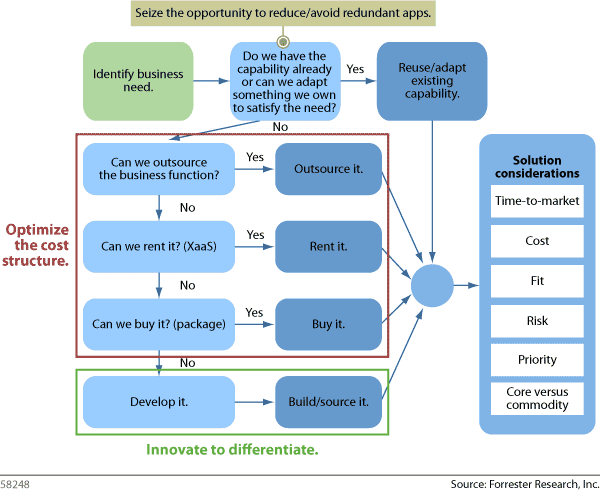Software Is Your Business – Forrsights Survey Data To Help Bust “No Software” And “Software Development’s Not Important” Myths
Just over 3 months ago, I made note of three things I'd tell your CIO, all of which focused on your need to build a software development competency to help your firm thrive in this age of software-fueled, consumer-led disruption. Since then, we've heard from a number of clients stating that they're having a tough time convincing their executives, from COOs and CFOs through to CIOs, that they need to stop looking at software and app development as a commodity.
Vendors you work with aren't helping. System integrators and consultancies continue to tell your CFO and CEO to outsource your software development work to them, that they can deliver more quickly, and more cheaply, than you can. Software application vendors build their marketing around needing no customization, even "no software." This helps fuel the perception and myths many executives hold that software development, especially app dev, is a commodity.
Recent research published by Phil Murphy and survey data we recently collected in our Forrsights Software Survey, Q4 2011 can help you bust those perceptions and myths and help you show your executives the importance of software development.
1) Play a different role: Be a solution broker to inform executive decisions. While software development isn't a commodity, many of the needs expressed by your business stakeholders can, and should, be addressed by more commodity solutions. Phil's recent research on skills and staffing for Agile and Lean provides a framework for how you can take on the role of solution broker to help change the discussion with executives to focus on where to source the right capabilities to meet business needs while reserving software development capacity for innovation and differentiation. 
2) Point out that in today's age of tech-fueled, consumer-led disruption, the app is the company. Fact: In our recent Forrsights Software Survey, Q4 2011, 77% of North American and European software decision-makers said that they are, and plan on, using in-house developers to develop mobile applications. Forty-six percent of decision-makers are also using specialist mobile app-development firms. We're finding that a key driving force behind this mix is recognition that in today's mobile engagement world, as far as your customers are concerned, the app is the company. Software development leaders we're speaking to are using this blended approach to build up the muscle memory needed to help their firm own its mobile engagement with its customers.
3) Note that delivering engagement requires custom development. Fact: In that same Forrsights survey, 29% of software decision-makers said that they will increase software salary spending in 2012, and 34% plan to spend more on custom software development. Areas where that custom software development's being applied include business needs supported by CRM, business intelligence, and business process management systems. We believe we know why. Ted Schadler's recent mobility research identifies the need for firms to focus on systems of engagement – systems that focus on people and context – and leverage analytics and intelligence to deliver in the moment. Today, engagement matters most for the systems and employees your customers directly engage with. You can't simply buy systems of engagement; you must deliver them through custom software development, as many of the decision-makers we surveyed seem to recognize.
We recognize the challenges many of you face in selling your executives on the importance of software development. Our research here continues to evolve, focusing on data and examples you can use to make fact-based arguments with your stakeholders. Keep us honest though – share your challenges to help inform our research.